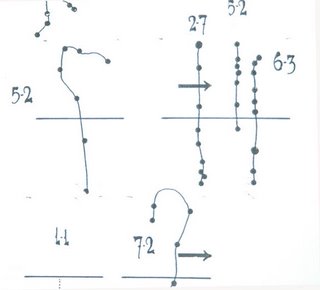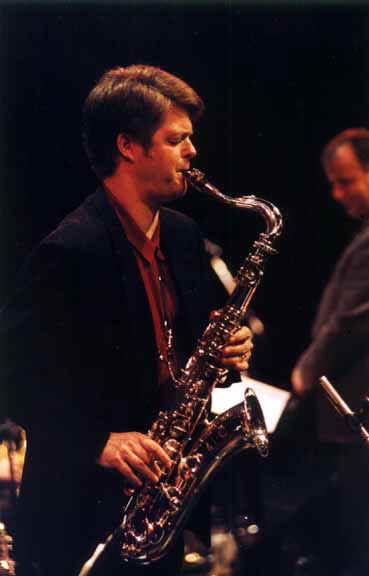It's now Sunday at the end of a very long week and I am pooped.
Vancouver New Music presented a 4-day festival called Silence:John Cage. I was invited to be part of the large ensemble playing Atlas Elipticalis on the final evening. There were about 18 people in the group, a mix of the free improv crowd and UBC new music types. I'd played with many of them previously, so it was a comfortable fit for me. It was also very pleasant to be rehearsing at the Scotiabank Dance Centre, with floor-to-ceiling views from the 7th floor.
 <- Giorgio Magnanensi and Marina Rosenfeld
<- Giorgio Magnanensi and Marina RosenfeldIt's always great to have a chance to work with VNM's artistic director, Giorgio Magnanensi, and he taught me an invaluable skill this time around, namely where to find the very best espresso in town and how to order it. He led the first day of rehearsals and it was fairly taxing, especially on him. Conducting this piece is akin to butoh dance, only slower.
 <- Carol Sawyer, Clyde Reed and me at Rime
<- Carol Sawyer, Clyde Reed and me at Rime
 <- Carol Sawyer, Clyde Reed and me at Rime
<- Carol Sawyer, Clyde Reed and me at Rime That night, I played a double-bill at Rime. The first set was with ion Zoo and it went very well. We are now a quartet, with Lisa Miller joining us whenever there is a piano available. Lisa is also part of the Atlas ensemble and at one point I became aware that she and I were both playing at that moment from a Cagian perspective. Afterwards, she confirmed that was the case. It was very cool to see that the Atlas experience had an immediate effect. It will be another tool in the ever-growing tool box.
The second set was with the Helsinki 8, just our third performance. The group has a lot of sonic possibilities, and gets stronger each time out. We did a set of mostly scored pieces, including my graphic score from Banff. It went well enough, though it did confirm my feelings that there is a much better piece hidden in there if I just use 10 per cent of the material. The gig was lightly attended. Blanche Norton, Rime's booker, told me that we were up against some stiff competition that night, particularly the Cage festival. That tickled me because half of the evening's performers were also in the festival. It was a fairly satisfying night on the whole, but getting in at 2:00 am just exhausted me the next day.
 <- 7 of the Helsinki 8
<- 7 of the Helsinki 8 Back bright and early at the Dance Centre, we were greeted by the guest artist for the Saturday performance. Marina Rosenfeld was described in this week's edition of Seattle's the Stranger as a "NY-based dub plate sorceress", and I thought the Georgia Strait had some flowery music writing... A quick visit to her website revealed her substantial credentials and she was indeed very stimulating to work with. She directed the group throughout the morning session, then had one-on-one discussions with each of us. She encouraged us to interpret Cage's performance notes to the word, and that definitely elevated the music as well as pushing our boundaries.
Many of the people in the ensemble remarked about how much work it took to perform the piece. Playing Cage requires a significant philosophical shift in one's approach to playing music, which in turn forces a pushing of technical boundaries. It just doesn't happen in a straight line, at least in the traditional sense.
 <- excerpt from Atlas Elipticalis percussion 1 part
<- excerpt from Atlas Elipticalis percussion 1 partAtlas Elipticalis was composed by Cage in 1961. The visual device for creating the score was achieved by overlaying star charts and the i ching on top of manuscript. All notes were to be played as quietly as possible, with as short a duration as possible unless otherwise indicated. There was to be no repeated notes, no "extraordinary" tone, no intention of melody and an avoidance of ego in the production of the sounds. Cage encouraged the idea of interpenetrations, wherein an instrumentalist produces two different sounds at the same time, say a bassist bowing with one hand and tapping the top with the other. Wind and string players were to play microtonally. Not all notes on the score had to be played. The list went on...
In short, rather than just a random production of sounds, musicians had to really think out how to play each and every note.
I had three sections where I had to play 70 notes or more in the space of 15 seconds. In other sections, maybe 9 notes in 2 minutes. And I decided to play just percussion. I had put together my rack with items that were often loud, had very long sustain and extraordinary sound quality, just the opposite of what Cage specified. So I had my work cut out for me. I had to find different ways of playing the rack, and ended up using bamboo skewers most of the time instead of sticks or mallets. Marina also wanted more "skins and wood", so I pulled whatever I could find out of my closet. It was quite a mixed collection, which I dubbed the "Randy Raine-Reusch Starter Kit".
In the end, the concert went very well in my opinion. Atlas Elipticalis was broken up into three sections. Other Cage compositions overlapped the various sections, often playing concurrently, yet they were distinctly different while occupying the same space. The audience and performers were intermingled and the audience was encouraged to move around to hear different sonic combinations. The program ended with two versions of the final composition John Cage wrote, first in the original piano/violin duet form, then with Marina doing a very musical and compelling version on her turntables, something Cage would have approved of, I'm sure.
 <- RR-R Starter Kit
<- RR-R Starter KitAs I was listening to those pieces seated behind my percussion, I had an interesting experience. The performance hall was dark except for the starkly lit soloists. I was looking through my rack in Marina's direction, but she was obscured by one of my bronze sound plates. The way the lighting was, it appeared that the plate was a black square, not between the two of us, but rather in the black curtains on the opposite side of the recital hall. Logically, I knew where the plate was hanging, but the more I looked, the more it appeared to be a black hole, square in shape, on the other side of the room. This black hole was absorbing the images of everything directly in front of it, cutting off human forms at the neck or wherever. This effect lasted for what seemed several minutes as long as I was caught up in the music. When it came to a point that was less engrossing, the effect ended.
I understand that Cage enjoyed his shrooms, so he probably would have approved of this as well.
